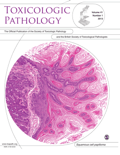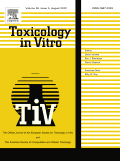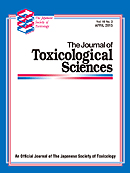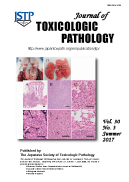
TOXICOLOGIC PATHOLOGY
Scope & Guideline
Innovating Insights into Toxicologic and Pathologic Challenges
Introduction
Aims and Scopes
- Toxicological Mechanisms and Pathology:
Research exploring the cellular and molecular mechanisms by which toxic substances induce pathological changes in various organ systems, including liver, kidney, and lung. - Histopathological Assessments:
Emphasis on the development and application of histopathological techniques to evaluate the effects of toxicants in animal models, contributing to the understanding of disease processes. - Preclinical Toxicity Studies:
Focus on the assessment of safety and efficacy of new drugs and chemicals through rigorous preclinical studies, including the use of animal models to predict human responses. - Novel Methodologies in Toxicology:
Incorporation of advanced technologies such as gene expression analysis, organoid models, and machine learning techniques to enhance the evaluation of toxicological effects. - Contributions to Regulatory Toxicology:
Providing insights and data that aid in the regulatory approval process for pharmaceuticals and chemicals, focusing on the implications for human health.
Trending and Emerging
- Organoid and 3D Culture Models:
There is a growing interest in utilizing organoid models and three-dimensional cultures for toxicological assessments, allowing for more physiologically relevant evaluations of drug and chemical effects. - Machine Learning and AI in Toxicology:
The application of artificial intelligence and machine learning techniques for analyzing toxicological data is trending, enhancing the ability to predict outcomes and streamline assessments. - Biomarkers of Toxicity:
Research focusing on identifying and validating biomarkers for early detection of toxicity is on the rise, providing critical insights for predictive toxicology. - Integrated Approaches to Risk Assessment:
Emerging studies are increasingly adopting integrated approaches that combine histopathological, biochemical, and behavioral evaluations to assess the overall impact of toxicants. - Focus on Environmental Toxicology:
There is an increasing emphasis on the effects of environmental toxicants and pollutants on health, reflecting a broader concern for ecological impacts and public health.
Declining or Waning
- Traditional Toxicity Testing Models:
There is a noticeable reduction in studies relying solely on traditional animal models for toxicity testing, as newer methodologies and in vitro models gain traction. - Single-Factor Toxicological Studies:
Research focusing on the effects of single toxicants in isolation is becoming less frequent, with a trend towards more complex studies that consider multi-factorial interactions. - Basic Histopathological Techniques:
The reliance on basic histopathological examinations without incorporating advanced imaging or molecular techniques is decreasing, as the field moves towards more integrative approaches. - Carcinogenicity Studies in Long-Term Models:
The traditional long-term carcinogenicity studies in laboratory animals are becoming less common, as shorter, more predictive models and alternative methods are being developed. - Generalized Toxicity Assessments:
Research that provides broad, non-specific toxicity assessments is waning in favor of studies that focus on specific mechanisms or pathways affected by toxicants.
Similar Journals

Food Additives and Contaminants Part A-Chemistry Analysis Control Exposure & Risk Assessment
Advancing food safety through rigorous analysis and risk assessment.Food Additives and Contaminants Part A-Chemistry Analysis Control Exposure & Risk Assessment, published by Taylor & Francis Ltd, is a leading journal in the field of food science, toxicology, and public health. With an ISSN of 1944-0049 and an E-ISSN of 1944-0057, this esteemed publication has established itself as a vital resource for researchers and professionals involved in the analysis and regulation of food additives and contaminants. Since its inception and through its converged years from 2008 to 2012 and again from 2014 to 2023, the journal has maintained an impactful presence, notably achieving a Q2 ranking in diverse categories including Chemistry (miscellaneous) and Food Science, alongside commendable standings in Health and Environmental Health. The journal’s mission is to foster high-quality research by providing a platform for critical studies related to chemical analysis, exposure assessments, and risk management in food safety. By prioritizing engaging, peer-reviewed content, it aims to enhance understanding and mitigate risks associated with food additives, making it an indispensable tool for academics, practitioners, and policymakers alike.

Toxicological Research
Fostering dialogue on the implications of toxins in our environment.Toxicological Research is a prominent academic journal dedicated to advancing the field of toxicology through rigorous exploration and innovative research. Published by the Korean Society of Toxicology, this journal serves as a vital resource for researchers, professionals, and students engaged in environmental science, pharmacology, and toxicology. With an ISSN of 1976-8257 and an E-ISSN of 2234-2753, Toxicological Research highlights significant findings and discussions in the realm of health, toxicology, and mutagenesis. Although not an open-access journal, it maintains a solid reputation as evidenced by its Q3 ranking in both health-related toxicology and general toxicology categories for 2023. The journal covers a broad spectrum of topics from fundamental research to applied toxicology and provides a unique platform for the dissemination of knowledge in a field that is increasingly relevant in today’s society. With an anticipated convergence period from 2008 to 2024, Toxicological Research continues to contribute vital insights to understanding the implications of toxic substances on health and the environment.

TOXICOLOGY IN VITRO
Bridging Knowledge Gaps in Toxicology and PharmacologyTOXICOLOGY IN VITRO is a premier journal published by PERGAMON-ELSEVIER SCIENCE LTD, focusing on the latest advancements in the field of toxicology, particularly through in vitro methodologies. With an ISSN of 0887-2333 and an E-ISSN of 1879-3177, this journal serves as a critical platform for researchers aiming to disseminate their findings in toxicology, emphasizing innovative approaches and applications in pharmacology and toxicology. Featuring a commendable impact factor and classified in the second quartile (Q2) for both Medicine (miscellaneous) and Toxicology in 2023, the journal holds a significant position within the academic community, ranking 41st out of 133 in the Toxicology category according to Scopus, representing the 69th percentile. Despite being a subscription-based publication, it continuously attracts submissions from leading scientists worldwide, fostering a vibrant exchange of scientific knowledge. Since its inception in 1987, TOXICOLOGY IN VITRO has consistently aimed to enhance understanding of toxicological challenges, making it an invaluable resource for professionals, students, and researchers dedicated to developing safer pharmaceuticals and understanding the biological pathways influenced by potential toxic agents.

TOXICOLOGY
Elevating research in toxicology to safeguard public health.TOXICOLOGY, published by Elsevier Ireland Ltd, is a prestigious peer-reviewed journal specializing in the field of toxicology. With an ISSN of 0300-483X and an E-ISSN of 1879-3185, this journal provides a vital platform for researchers, professionals, and students to disseminate and access groundbreaking studies from 1973 to present, with a convergence set until 2024. Recognized for its high impact, it holds a Q1 ranking in Toxicology category and ranks #18 out of 133 in Scopus's sector of Pharmacology, Toxicology, and Pharmaceutics, placing it in the 86th percentile. While the journal is not open access, it nonetheless offers a rich collection of research articles that enhance the understanding of toxicological science and its applications. The journal's objectives encompass advancing knowledge in the toxicological evaluation of substances, promoting safety in public health, and fostering dialogue among scholars. As a key resource in the field, TOXICOLOGY plays a crucial role in advancing research and informing practices related to toxicological risks and safety assessments.

Toxicology Research
Advancing toxicology for a safer tomorrow.Toxicology Research is a distinguished journal dedicated to advancing the field of toxicology through the dissemination of high-quality research. Published by Oxford University Press, this UK-based journal focuses on critical aspects of toxicology and mutagenesis, highlighting both environmental and pharmacological implications. With an ISSN of 2045-452X and an E-ISSN of 2045-4538, it serves as a valuable resource for researchers, professionals, and students alike. Currently categorized in the Q3 quartile for Health, Toxicology and Mutagenesis, as well as Toxicology in 2023, Toxicology Research maintains a visible presence in Scopus rankings, positioning itself within the targeted professional community. Although the journal operates without open access options, its importance in contributing to scientific discussions and policy formation is undeniable. Covering content from 2012 to 2024, it continues to provide insights into contemporary toxicological challenges, thereby fostering interdisciplinary collaborations and informing best practices in health and safety.

JOURNAL OF TOXICOLOGICAL SCIENCES
Innovative Insights into Toxicological ScienceThe Journal of Toxicological Sciences, published by the Japanese Society of Toxicological Sciences, is a prominent academic journal dedicated to the comprehensive study of toxicology and its related fields. Since its inception in 1976, the journal has provided a vital platform for researchers and professionals to disseminate innovative findings and insights in toxicology, with a focus on both experimental and clinical studies. Positioned in the Q3 quartile across various relevant categories, including Medicine (miscellaneous) and Toxicology as of 2023, the journal plays an essential role in advancing our understanding of toxic substances and their effects on biological systems. Although currently not open access, the journal maintains high academic standards and is indexed in Scopus, ranking #96 in Toxicology. Offering unique perspectives from Japan, it encourages global collaboration and discourse among toxicologists, making it an invaluable resource for students, researchers, and industry professionals alike.

Journal of Toxicologic Pathology
Exploring the Complexities of Toxicology and Pathology.Journal of Toxicologic Pathology is a pivotal resource in the realm of pathology and toxicology, published by the Japanese Society of Toxicologic Pathology. Since its inception in 1988, this esteemed journal has been committed to advancing scholarly discourse through the dissemination of rigorous research and reviews that address the intricacies of toxicologic pathology. With a current impact factor placing it in the Q3 quartile in both Pathology and Forensic Medicine as well as Toxicology categories, it serves as a crucial platform for academics and practitioners to share insights and findings. Situated in Japan, this journal fosters international collaboration, welcoming contributions that span diverse geographical and scientific contexts. Although not open access, it continues to play a significant role in shaping the future of toxicological research and education, and it remains an invaluable asset for those engaged in the study of disease mechanisms, safety assessments, and the impact of toxic substances on biological systems.

Frontiers in Toxicology
Unveiling the Complexities of Pharmacological ImpactsFrontiers in Toxicology, published by Frontiers Media SA, is a prominent open-access journal dedicated to advancing the understanding of toxicological science. Established in 2019, it serves as a vital forum for innovative research, offering insights into the pharmacological impacts and toxicological profiles of various substances. With its international reach based in Switzerland, this journal has quickly ascended in the academic community, achieving a notable Q1 ranking in Pharmacology, Toxicology and Pharmaceutics (Miscellaneous) and a Q2 ranking in Toxicology as of 2023. The journal is indexed in Scopus, where it ranks #8 out of 43 in its primary category, underscoring its influence and relevance in the field. The scope encompasses cutting-edge studies on the mechanisms of toxicity, including both human and environmental impacts, making it an essential resource for researchers, professionals, and students alike. By promoting open access to high-quality research, Frontiers in Toxicology plays a crucial role in enhancing knowledge sharing and fostering collaboration across disciplines.

Current Research in Toxicology
Innovative Research for Real-World ApplicationsCurrent Research in Toxicology is a pioneering journal published by ELSEVIER that serves as a vital platform for disseminating cutting-edge research in the field of toxicology, spanning from biological impacts to pharmacological applications. With an ISSN of 2666-027X and an impressive Q2 ranking in key categories such as Applied Microbiology and Biotechnology, Health, Toxicology and Mutagenesis, and Toxicology, this journal underscores its commitment to high-quality research and significant contributions to the scientific community. Based in the Netherlands, Current Research in Toxicology aims to bridge the gap between academia and industry by providing rigorously peer-reviewed articles that cover a wide array of topics including novel methodologies, regulatory challenges, and emerging trends within the domain. The journal is accessible through various platforms, making it essential for researchers, professionals, and students eager to stay updated on the latest findings and advancements in toxicology. With a comprehensive focus on integrating theory with practical application, this journal is poised to influence future studies and policies in health and environmental science.

EXPERIMENTAL ANIMALS
Connecting researchers with transformative findings in animal science.EXPERIMENTAL ANIMALS is a leading journal that serves the vibrant fields of Animal Science, Veterinary Medicine, and Biochemistry, Genetics, and Molecular Biology, published by the prestigious INT PRESS EDITING CENTRE INC in Japan. Boasting an impressive track record since its inception in 1974, the journal has positioned itself as a crucial platform for researchers aiming to disseminate innovative findings in experimental animal research. With a commendable impact factor and categorized in the Q2 and Q3 quartiles by Scopus in various relevant fields for 2023, EXPERIMENTAL ANIMALS exemplifies excellence in its contributions to science. The journal offers a comprehensive range of articles spanning from animal welfare and experimental methodologies to genetic studies, ensuring a multidisciplinary approach that appeals to a diverse audience of researchers, professionals, and students. Access to its wealth of knowledge fosters significant advancements in research and practice, underlining the journal's commitment to enhancing understanding of animal models in scientific inquiry.